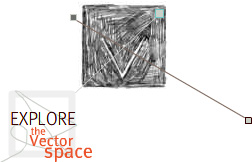Panorama Ephemera
Design by Raegan Kelly
Editor's Introduction
No treatment of the theme Ephemera would be complete without considering Rick Prelinger's work over the past two decades to preserve, archive and recognize the value of Hollywood's "other," the obscure and sometimes surreal world of ephemeral films. The San Francisco-based Prelinger, who has been collecting advertising, educational and industrial films for more than two decades, in 2002 sold his collection of over 50,000 films to the Library of Congress. He has since turned his energies to advocating a renewed conception of archival practice that involves actively pushing works out into the public, rather than simply storing them passively.
In 2005, Prelinger completed a feature film titled Panorama Ephemera, a meditative chronicle remarkably free of the camp humor of many ephemeral remixes. The images and sounds presented in Prelinger's film are treated with meticulous respect for their materiality and status as signifying objects. Each shot or sequence in the film forms part of a "cognitive map" of American history, revealing patterns of obsession that orbit around such mundane but foundational themes as growing food, Westward migration, the transformation of landscape, and the development of democracy, as well as relationships among animals, humans, nature and civilization.
The online version of Panorama Ephemera, created in collaboration with Vectors Art Director Raegan Kelly, is similarly devoted to preserving the integrity of individual media elements, while interweaving them with Prelinger's own personal and professional trajectories, milestones and musings. Perhaps most interesting is the opportunity this project provides to explore Prelinger's personal history via the artifacts by which his career has been defined. In foregrounding Prelinger's personal history as a lens through which to view the films, Panorama Ephemera models a form of historiography, that underscores the inevitability of authorial intervention in the process of assembling a historical narrative.



